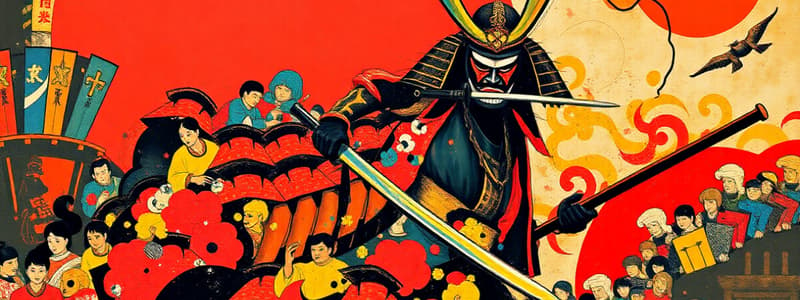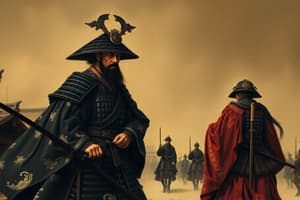Podcast
Questions and Answers
Which of the following factors contributed MOST significantly to the rise of the samurai class in Japan?
Which of the following factors contributed MOST significantly to the rise of the samurai class in Japan?
- The emperor's direct appointment of samurai to administer provinces.
- A widespread conversion to Christianity, which promoted warrior values.
- The increasing power of regional clans and the need for protection. (correct)
- The expansion of international trade and the need for maritime defense.
How did the establishment of the shogunate system MOST significantly alter Japan's political structure during the 12th century?
How did the establishment of the shogunate system MOST significantly alter Japan's political structure during the 12th century?
- It led to the complete abolishment of the imperial throne.
- It concentrated military and governmental power in the hands of the shogun. (correct)
- It isolated Japan from foreign cultural influences.
- It distributed power equally among all noble families.
What BEST describes the main difference between the role of the samurai during the Heian period and their role during the Kamakura period?
What BEST describes the main difference between the role of the samurai during the Heian period and their role during the Kamakura period?
- Samurai evolved from land owners to merchants in urban centers.
- Samurai transitioned from focusing on academic pursuits to exclusively military training.
- Samurai went from serving the shogun to directly serving the emperor.
- Samurai shifted from being protectors of nobles' lands to a powerful ruling class. (correct)
Which aspect of samurai culture had the MOST enduring influence on modern Japanese society?
Which aspect of samurai culture had the MOST enduring influence on modern Japanese society?
How did Zen Buddhism MOST influence the samurai during the Kamakura period:
How did Zen Buddhism MOST influence the samurai during the Kamakura period:
Flashcards
What is a Shogun?
What is a Shogun?
Ruling military commander who controlled Japan.
What is the Shogunate?
What is the Shogunate?
Japanese system of government under a military governor (Shogun) with complete power.
Who were the Samurai?
Who were the Samurai?
Highly-skilled warrior who offered protection, evolved from protectors of nobles' lands.
What is Bushido?
What is Bushido?
Signup and view all the flashcards
What did Samurai Study?
What did Samurai Study?
Signup and view all the flashcards
Study Notes
- In the 12th century, clans fought for control of Japan, leading to a new government headed by a shogun.
- Minamoto no Yoritomo was the first shogunate and awarded the samurai the rank of nobility.
- The shogun was the ruling military commander who controlled Japan, and this period of rule was called a shogunate.
- The shogunate was a Japanese system of government with a military governor, the shogun, holding complete power over Japan.
- The shogun gained so much power that he also held power over the emperor.
- As Japanese society resembled a feudal society, wealthy people needed protection for their land.
- They turned to the samurai to serve as protectors.
- Power struggles led to changes in the Japanese social structure.
- The samurai rose to power in the 12th century along with the shogun.
- The samurai was a highly skilled warrior who protected the shogun, evolving from protectors of nobles' lands to a powerful class of noble warriors.
- This coincided with the rise of the shogun and the focus on Zen Buddhist beliefs.
- Many Japanese people emphasized martial arts training due to a history of conflicts.
- The samurai underwent extensive martial arts and academic training, including politics and poetry.
- The samurai lived by strict self-imposed rules that reflected the foundation of the samurai culture.
- The samurai became nobles and developed a code of honor and studied poetry and art.
- Loyalty and honor were essential for the samurai, so they developed strict rules and an uncompromising code of honor known as the bushido code.
- Although samurai no longer exist, their legacy lives on in Japanese history.
Studying That Suits You
Use AI to generate personalized quizzes and flashcards to suit your learning preferences.




